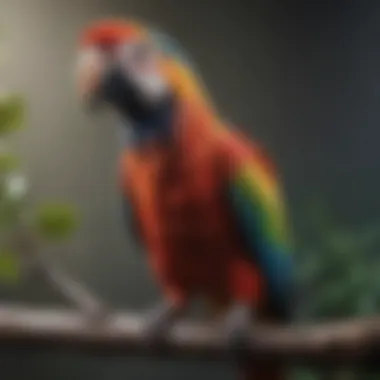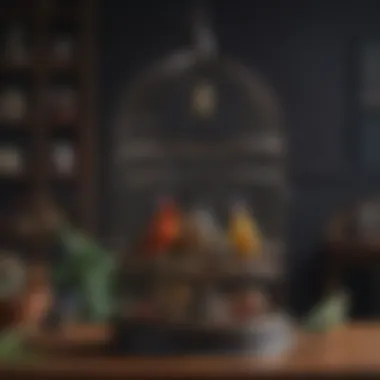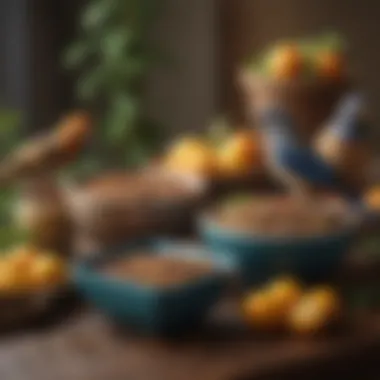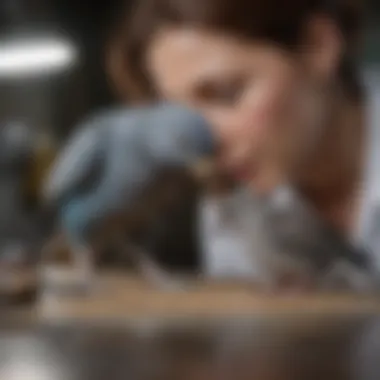Understanding the Costs of Owning a Pet Bird


Intro
Owning a pet bird, while fulfilling, comes with several costs that can easily accumulate. For prospective owners, understanding these expenses is critical. This article provides a thorough breakdown of both one-time and ongoing costs associated with pet birds. From the initial purchase to long-term care, readers will gain insights that are important for responsible pet ownership.
Animal Overview
Common Name and Scientific Classification
Birds belong to the class Aves. They are diverse, with thousands of species worldwide. Common pet birds include the budgerigar (Melopsittacus undulatus), cockatiel (Nymphicus hollandicus), and lovebirds (Agapornis spp.). Each species has unique requirements and characteristics that play a role in cost considerations.
Physical Characteristics
Birds vary significantly in size and appearance. Smaller species like finches are generally less expensive to maintain compared to larger birds like macaws. Size impacts housing costs, diet, and care. Owners should be aware of physical traits, which can influence their choice.
Habitat and Distribution
Birds are found in nearly every habitat on Earth, from forests to deserts. Understanding a bird’s natural habitat can help owners replicate an environment that promotes well-being. A proper habitat includes cages suited to the birds' needs, enriched with toys and resting areas.
Behavior and Social Structure
Communication Methods
Birds communicate through vocalizations and body language. Understanding these methods helps owners interpret their pet's needs and emotions. For example, a chirping budgerigar can signify happiness or alertness.
Social Hierarchies
Different species have distinct social needs. Social birds like parakeets thrive in pairs, while others may prefer solitude. Recognizing this is essential for ensuring the bird's mental health, which indirectly can affect costs through potential behavioral issues if not adequately cared for.
Mating and Reproductive Behavior
Breeding can introduce additional costs. Understanding seasonal behaviors and needs during breeding season is important. Owners should consider whether they want to breed their birds, as this can lead to expenses related to nest building and care for hatchlings.
Conservation Status
Current Population Trends
Many species of pet birds are stable, while others face significant threats. Understanding the conservation status of a chosen species can influence an owner's decision if they are passionate about wildlife conservation.
Threats and Challenges
Habitat loss, climate change, and illegal trapping affect bird populations. Owners should be aware of these issues as they consider their responsibilities towards fostering a healthy life for their pet.
Conservation Efforts and Success Stories
Numerous organizations work to protect bird species, with varying success. Being an informed owner may motivate individuals to support these initiatives, which can add potential costs but fulfill ethical responsibilities.
Owning a pet bird requires comprehensive understanding of its needs and costs involved. This knowledge supports both the bird's health and the owner's financial planning.
Preamble to Pet Bird Ownership
Understanding the financial implications of pet bird ownership is essential for prospective owners. Many individuals are attracted to birds because of their beauty, temperament, and companionship. However, there is more to owning a pet bird than just the initial purchase or adoption cost. This section introduces various aspects of pet bird ownership, emphasizing the importance of being fully informed and prepared.
Why Choose a Pet Bird?


Choosing a pet bird comes with unique advantages. Birds can form strong bonds with their owners, providing companionship that is often unmatched by other pets. They are also relatively low maintenance compared to dogs or cats. Their smaller size makes them suitable for various living environments, including apartments. Additionally, birds such as parrots and canaries exhibit a range of colorful plumage and enchanting vocalizations, which can be quite delightful.
However, prospective owners should keep in mind that birds can be very social animals who require interaction. Many species are known for their intelligence and may develop behavioral issues if neglected. Therefore, the choice to adopt a bird should be weighed carefully, considering both the joys and responsibilities.
Overview of Popular Bird Species
When considering a pet bird, it's important to understand different species and their unique characteristics. Each species comes with specific care needs and cost factors. Popular choices include:
- Budgerigar (Budgie): These small parrots are friendly and relatively low-maintenance, making them ideal for first-time owners.
- Cockatiel: Known for their affectionate nature, cockatiels require social interaction and some space to move.
- Lovebirds: Highly social and playful, lovebirds thrive in pairs or groups, demanding attention.
- African Grey Parrot: Renowned for their intelligence and speaking ability, these birds need extensive stimulation and companionship.
- Canary: Generally solitary, canaries are low-maintenance and known for their beautiful songs.
Initial Costs of Acquiring a Pet Bird
The decision to bring a pet bird into one’s home is not solely driven by the appeal of their companionship. It is essential to understand the initial financial outlay associated with bird ownership. This aspect lays a foundation for understanding the long-term commitments that come with caring for a feathered friend. The initial costs can vary greatly based on the choice of species, the method of acquisition, and the necessary supplies for the bird's well-being.
Purchase Price of Different Bird Species
The purchase price of pet birds can fluctuate widely based on species. For example, popular types such as Budgerigars or Cockatiels are often more affordable, ranging from $20 to $200. In contrast, exotic birds like Macaws or Cockatoos can result in expenditures exceeding $1,000 due to their rarity and demand. Canaries and Finches typically fit the more economical category, often found for $30 to $100. This price matrix reflects not only the economic consideration but also the responsibility that comes with owning a bird, as their needs and commitment levels can differ drastically.
It is also crucial to weigh the benefits of choosing a bird from a reputable breeder versus a pet store. Breeders may provide health assurances and valuable information about the specific species, while stores may offer convenience but lack thorough background information on avian care.
Costs Associated with Bird Adoption
Adopting a bird from a shelter or rescue organization can introduce its own unique considerations. Adoption fees for birds can vary, generally ranging between $50 to $300. These fees often encompass an initial health examination as well as vaccinations, which can be particularly beneficial for newcomers to avian care. In addition, adopting a bird not only provides a home for a pet in need but also contributes to the well-being of the overall pet community.
However, potential owners should assess the individual bird’s needs and history. Understanding behavioral issues or health concerns flagged in available rescue information can influence your ongoing costs and personal time commitment.
Supplies Needed Before Bringing the Bird Home
Preparing for a new pet bird requires acquiring essential supplies that ensure the comfort and health of the animal. This preparation represents a significant initial cost and includes several key items:
- Cages: Depending on size and material, cages can range from $50 to over $500. Choosing the right size cage based on the bird species is crucial for their well-being.
- Food and Water Dishes: Simple dish sets cost around $10.
- Bird Food: Initial purchases of appropriate bird food usually run from $20 to $50. Certain species have specific dietary needs that must be considered.
- Perches and Toys: Providing stimulation through toys and perches is essential for mental health, which may add another $30 to $100.
- Bedding: Selecting appropriate bedding materials can vary, generally costing approximately $10 to $30.
Understanding these initial costs sets the stage for future ongoing expenses. It is not just about the acquisition, but also how well the bird is cared for in those first crucial days.
In summary, the initial costs of acquiring a pet bird encompass various elements that must be thoughtfully assessed. It is not merely a financial consideration, but one that reflects the responsibilities of bird ownership. This financial groundwork enables informed decisions that benefit both the bird and the owner in the journey of companionship.
Ongoing Care Costs
Understanding ongoing care costs is essential for anyone considering bird ownership. These expenses can accumulate and lead to financial strain if not properly planned for. Regular costs include food, housing maintenance, and health care. Evaluating these elements helps prospective bird owners gauge their financial readiness.
Feeding Expenses
Proper nutrition is critical for the well-being of pet birds. The choice of bird food impacts overall health and lifespan. Failing to invest in quality food can lead to expensive health problems.
Types of Bird Food
Different species require specific types of bird food. Common options include pellets, seeds, and fresh fruits and vegetables. Pellets are the most beneficial choice for many because they provide balanced nutrition. On the other hand, seeds may lack essential vitamins and minerals, which could lead to deficiencies.
A key characteristic of pellets is their formulation, which often includes all the necessary nutrients for a bird's diet. This can be particularly advantageous for busy owners. However, some birds can be picky when it comes to pellets, which means transitioning them may require strategy and persistence.
Supplemental Nutrition
In addition to primary bird food, supplementary nutrition is important for overall health. Foods such as fresh fruits and vegetables can strengthen the diet. These supplements add variety and can benefit specific dietary needs.


A unique feature of supplemental nutrition is that it enhances the enjoyment of feeding. Birds often appreciate the fresh flavors. However, owners must be cautious about the quantity, as excess can lead to health issues like obesity.
Housing and Cage Maintenance
A suitable habitat is critical for a bird's mental and physical health. Investing in a proper cage not only ensures comfort but also aids in overall care management.
Cage Types and Prices
Cage types vary widely, from simple small cages to large aviaries. Prices can range from $50 to $500, depending on the size and quality. A larger cage is generally recommended for activity and movement. This directly contributes to a bird's quality of life.
A significant aspect of cage choices is the material; metal cages are sturdy and easy to clean, while wooden cages offer aesthetics but may require more maintenance. The right choice influences both comfort and the long-term costs associated with upkeep.
Cleaning Supplies
Keeping a bird's cage clean is essential for preventing illness. Regular cleaning requires supplies such as disinfectants, scrub brushes, and liners. These additional costs should be considered in the budget.
The key characteristic of cleaning supplies is their role in maintaining hygiene. Using appropriate products helps ensure the health of the bird and creates a pleasant environment. Some owners may use natural cleaning agents to avoid harsh chemicals. While effective, success depends on proper application and frequency of cleaning.
Health Care and Veterinary Expenses
Regular veterinary visits are vital for preventing disease and catching health issues early. These costs should be anticipated by any future bird owner.
Routine Check-Ups
Routine check-ups provide insights into a bird's health status. These check-ups allow for routine vaccinations and screenings for common illnesses. Scheduling these visits regularly is an essential practice for responsible ownership.
A unique feature of routine check-ups is the opportunity for owners to learn more about their bird's needs. However, the financial aspect can be daunting, as these visits typically range from $50 to $150, depending on the vet and location.
Emergency Care
Emergency care represents the unpredictable part of pet ownership. Accidents and health crises can occur unexpectedly, requiring immediate veterinary attention. Owners must be prepared for such costs, which can soar to several hundred dollars or more.
One key characteristic of emergency care is its urgency; rapid response can often mean the difference between life and death. Therefore, budgeting for an emergency fund is as crucial as regular expenses. While it may seem burdensome, being prepared offers peace of mind and reflects responsible ownership.
Budgeting for ongoing care costs ensures that you can provide a healthy and safe environment for your feathered friend.
Additional Expenses to Consider
Considering a pet bird entails understanding not just the fundamental expenses but also the additional ones that can accumulate. These expenses may seem minor at first, but they can significantly impact your overall budget. It's crucial for prospective bird owners to have a realistic expectation of all potential costs. This part of the article covers critical elements regarding accessories, enrichment, and travel costs.
Accessories and Enrichment
Toys and Perches
Toys and perches play a vital role in the mental and physical well-being of pet birds. They provide stimulation and encourage natural behaviors. Birds are intelligent creatures and need challenges to keep them engaged. These accessories come in various types to suit different species and preferences. A well-chosen toy or perch can promote exercise and prevent boredom.
An essential characteristic of these items is their diversity. You can find toys made from wood, rope, and plastic. Each material has its benefits, like being easy to clean or highly durable. Perches also vary in texture and size, catering to various bird species. For example, natural wooden perches can help support foot health and mimic a bird's natural habitat.
However, choosing toys and perches comes with its own set of considerations. Not all toys are safe for every bird species. For instance, toys with small parts might pose a choking hazard. It is critical to assess the suitability of each item for your bird's size and behavior.
Training Tools
Training tools are another important aspect of pet bird ownership. These tools help in establishing a bond between the owner and the bird while also offering mental stimulation. Effective training tools promote learning and adaptability, essential for a pet's happiness and safety.


A defining characteristic of these tools is their ability to facilitate positive reinforcement. You can find clickers and treats designed specifically for avian training. Utilizing these tools can make the training process smoother, encouraging the bird to engage positively with commands.
Unique features of training tools include their convenience. For instance, clickers are portable and can be used in various settings. Nevertheless, there are considerations to keep in mind. Not all birds respond to training in the same way, and the process can require patience and consistency from the owner.
Travel and Boarding Costs
Travel and boarding costs are additional expenses that many new bird owners might overlook. You may need to travel for various reasons, such as vacations or visiting family. In this case, finding a suitable boarding facility is necessary. Not all places accept birds, and those that do may charge varying fees.
When considering boarding, ensure the facility has proper amenities for birds. It should be safe and provide an environment suitable for your pet's needs. Look for places that have experience with birds and can cater to their specific diet and socialization needs.
Financial Planning for Pet Bird Ownership
Financial planning is an essential component of pet ownership, particularly for bird owners. The cost of maintaining a pet bird can be significant and varies widely based on species, care requirements, and personal choices. By establishing a comprehensive financial strategy, potential bird owners can ensure they are prepared for both anticipated and unexpected expenses.
This planning includes assessing initial costs of purchasing a bird, ongoing care such as food and veterinary services, and additional expenses like toys and accessories. One key benefit of planning is that it allows the owners to allocate their resources wisely, ensuring that every aspect of their bird’s life is accounted for. Additionally, understanding costs can alleviate stress and help in avoiding regrettable financial decisions.
Factors to consider include:
- Type of bird and its specific needs
- Quality of food and health care
- The initial setup for the bird's environment
- Keeping a reserve for unexpected emergencies
A well-prepared approach leads to a more satisfying and stable experience for both the bird and owner.
Creating a Budget for Bird Care
Establishing a budget is a crucial step in the financial planning process for pet bird ownership. This budget should cover all possible expenses across a timeline. Start with initial costs such as the price of the bird and the necessary supplies to create a suitable habitat. Follow this with recurring expenses aimed at food, health care, and daily care.
A basic breakdown of a bird care budget might include:
- Initial Costs:
- Ongoing Costs:
- Purchase price of the bird
- Cage and accessories (perches, food bowls)
- Food and dietary needs
- Veterinary check-ups and treatments
- Regular accessories and toys
It is prudent to review and adjust the budget regularly to reflect any changes in circumstance or unforeseen costs.
Cost-Effective Practices for Bird Owners
Adopting cost-effective practices can greatly enhance the bird ownership experience while reducing financial burden. Here are several strategies that may help:
- Bulk Purchasing: Buying bird food and supplies in bulk can lead to significant savings over time.
- Home-Made Toys: Instead of purchasing commercial toys, consider making some at home using safe, inexpensive materials.
- Regular Health Check-Ups: Early detection of health issues through regular vet visits can prevent costly emergency treatments later.
- Join Bird Owner Communities: Websites like Reddit or Facebook groups offer valuable insights, tips, and sometimes discounts from fellow bird owners.
Implementing these practices not only reduces financial strain but also enhances the joy of owning a pet bird by fostering a positive and enriching environment.
End
Summary of Costs and Responsibilities
The costs of owning a pet bird can be broken down into several key areas:
- Initial Costs: These include the upfront price of the bird, adoption fees if applicable, and supplies such as cages, perches, and food dishes.
- Ongoing Care Costs: Regular feeding, veterinary check-ups, and health care must be factored in to ensure the well-being of your bird. The dietary needs can vary significantly depending on species, which can influence the expense.
- Additional Expenses: Accessories for enrichment, travel costs, or potential boarding fees can arise. These costs may vary greatly based on individual circumstances and choices.
Bird owners must also consider the responsibilities that come with their new companion. Beyond financial aspects, understanding the time and effort required for care and social interaction is crucial. These factors enhance the overall experience and quality of life for both the bird and its owner.
Encouragement for Responsible Ownership
Pet birds can be delightful companions, providing entertainment and camaraderie. However, owning a bird requires commitment. Prospective owners should assess their financial situation carefully before making a decision. It's wise to prepare a budget that reflects all potential costs, including unexpected medical events that may arise.
Owning a bird is about more than just the love of pets; it's about creating a safe and enriching environment for a vulnerable creature. The joys of a well-cared-for bird can significantly outweigh any challenges faced. Adopting a responsible ownership mentality will not only benefit the bird but also enrich the owner's life immensely.
"Responsible pet ownership is a commitment that extends beyond the initial acquisition of a pet. It requires ongoing effort in every aspect of care."







